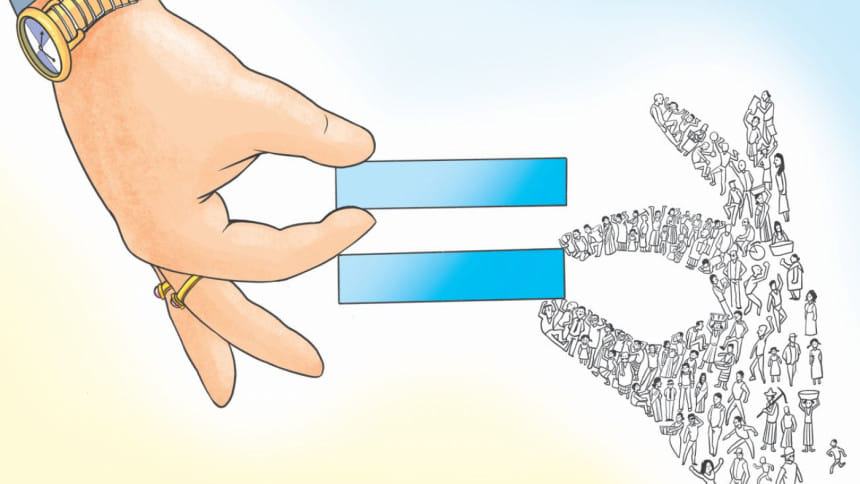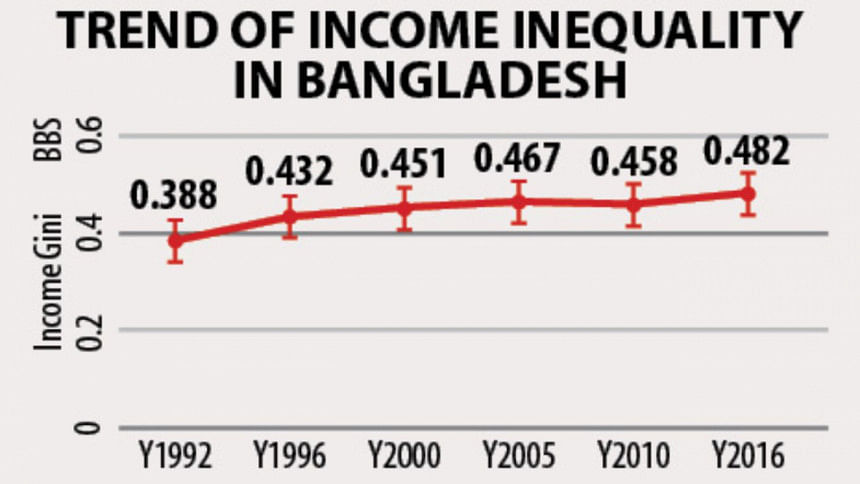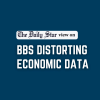Inequality at all-time high


Indian Prime Minister Narendra Modi once said that growth that is not inclusive is not meaningful but just economic figures. And this proclamation seems to be gradually becoming relevant for Bangladesh.
Bangladesh has become the toast of the development world for its stellar growth momentum that is expected to place it amongst the top three fastest growing economies in the world by next year.
And yet, inequality in the country is at an all-time high.
As per the latest Household Income and Expenditure Survey (HIES) of Bangladesh Bureau of Statistics (BBS), the country’s Gini coefficient, which is the economic measure of equality, stood at 0.482 in 2016, up from 0.458 in 2010, in a worrying development.
The Gini coefficient is measured on a scale of 0 to 1; the closer it is to 1 the higher the inequality is in the society.
Inequality can be assessed in many different ways and sometimes the conclusions depend on the measure used, said Zahid Hussain, lead economist of the World Bank’s Dhaka office.
“In case of Bangladesh, however, no matter what indicator you use, the conclusion that inequality has increased in recent years is inescapable,” he added.
The trend then raises questions and concerns about the quality of Bangladesh’s much-lauded GDP growth.
“The economic growth in recent years has been far from inclusive,” said Selim Raihan, executive director of the South Asian Network on Economic Modelling (SANEM).
The official statistics show that the country experienced accelerated GDP growth rate since 2013; the GDP growth in recent years has been the highest in the country’s history.
“However, inequality rose significantly during this period -- this is a big concern,” he added.
One reason is the disconnect among economic growth, wage growth and job creation, according to Hussain.
While estimates from the Bangladesh Bureau of Statistics show that GDP growth has accelerated in recent years, but job growth has slowed and real wage growth has been sluggish at best.
“The high GDP growth over the past few years has been unable to lead to large scale job creation -- the country is witnessing a phase of jobless growth,” Raihan said.
Poor people are not getting enough scope for productive income-generating employment activities.
This has resulted in the slow progress in poverty reduction and rising inequality, according to Raihan, also a professor at the Dhaka University’s economics department.
The public expenditure on education and health as share of GDP is very low and has declined in recent years.
“Such a low expenditure does not help improve the productivity of workers and is not consistent with the effort to reduce poverty and inequality,” he added.
The WB’s Hussain echoed the view.
“There is an increasing inequality of opportunities particularly in access to health care, education, financial services and social protection.”
Heath and education outcomes remain much worse for disadvantaged groups.
Low-income households and small-scale firms often face challenges in accessing financial services due to a lack of financial knowledge, complicated processes, onerous paperwork and other market failures, he added.
The government’s social protection programmes are too inadequate to reduce poverty and regional disparity, according to Raihan.
“There is a need for a substantial rise in the allocation for and leakage-free disbursement of the social protection fund,” he added.
Hussain also put a portion of the blame on regressive fiscal policies, particularly taxation policies, that end up benefitting the better off than the poor on the growing inequality.
Even expenditure programmes that are targeted to the poor suffer from serious leakages appropriated by the wealthier classes.
“A fourth reason is corruption. Using public office for private gains is something the poor are never in a position to engage in and benefit from.”
Nor are the poor in a position to access privileges that the government gives to particular businesses and interest groups in the form of bailouts, loan rescheduling, tax exemptions, subsidies, licences and so on.
Inequality is not an inevitable consequence of economic growth. In fact, long-term growth and social stability are two important reasons to focus on equity.
“A stronger focus on faster inequality reduction, especially in a country like Bangladesh, with still a very large number of poor people, will further enhance the power of economic growth to translate into poverty reduction and better opportunities for all,” Hussain added.


 For all latest news, follow The Daily Star's Google News channel.
For all latest news, follow The Daily Star's Google News channel. 








Comments